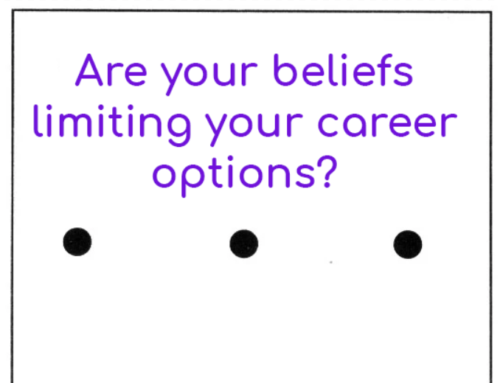Is overthinking stopping you from making any changes to your career?
Having endless thought loops on the same old issues, rather than acting on them and actually making meaningful changes in your life and career, is something I’ve struggled with in the past.
Many of my clients struggle with this too, so in today’s article I’m sharing with you the best ways to overcome this crippling habit of overthinking; in other words, these are methods and perspectives that have actually helped myself and others profoundly.
1. Accept you can’t change the past
No matter how much you try, you can’t change the past. But what you can change is the meaning you give to the past, which in turn can influence your future, starting today.
Some of my clients regret certain career decisions they made 10 years ago, or they regret actions they didn’t take, missed opportunities. Accepting wholeheartedly that you can’t change what has already happened, is really important if you want to break the cycle of overthinking.
Remind yourself that the good thing that has come from this past action or inaction, is that you’re now ready to learn from it. There might have been a time when you were not ready, and that’s okay, but today you’re ready to accept it, and to use this learning on the new path you’re carving for yourself. Life is all about learning from your mistakes.
2. Put your problem into perspective and show gratitude
This is one of my favorite ways to reframe my own problems. When I find myself ruminating on an issue, I ask myself how much my problem will matter in the future.
Will it still affect me in 1 year? What about in 3 or 5 years? A lot of the time, the answer is that at that point, my problem is water under the bridge. So why waste time and energy overthinking it to death?
If I need a bit more help to stop my endless thought loops, I ask myself how big a problem this actually is compared to other people’s problems. Loved ones, acquaintances, people I see on the news who live in countries ravaged by famine, war or authoritarian rule for example.
The truth is, 95% of the time, my problems pale in comparison with the problems many other people have, problems where A LOT more is at stake. It’s important to be grateful for what you have, and whenever I feel particularly sorry for myself, I write 10 things to be grateful for down every morning. They can be small or big things, but I keep doing this, usually for 3-4 days, until I genuinely feel better about my issue.
3. Connect to this present moment
So that you can actually begin to address and deal with the habit of overthinking, you need to learn to be aware of when it happens.
I have found that my ability to do so has improved over time after I started dedicating time to meditation and mindfulness practise. Over the past 3 years I’ve been meditating for 10-20 minutes (more or less) most mornings, and as part of this ritual I remind myself to be aware and present of my emotions throughout the day. (I’m a big fan of this app called Waking Up by Sam Harris.)
I’ve found that becoming better at stopping negative emotions in their tracks is key to taking control of my thoughts, and hence to prevent overthinking.
Once you notice you’re overthinking, breathe and focus on the moment. Ask yourself what you feel, see and hear. This moment is literally the seed of the change that you want to make.
Mindfulness improves over time, but it’s really worth it. For me it has probably been the most rewarding area in my self-improvement practise over the last few years.
4. Take control of your emotions and know when your gut feeling speaks to you
Following the above point about improving your skill of checking and observing what you feel, see and hear in the present moment, the next step is to identify why this is happening. What is the root cause of why you react in a certain way? What larger fear is at play here?
We often have larger fears that hold us back, for example fears about not progressing the way we had hoped, or fears about never finding your dream role. You can’t and shouldn’t bury these emotions, you need to deal with them and face them heads on.
Sometimes the fear is your gut feeling telling you that something isn’t right. When this happens, it’s really important that you listen to it and take it seriously. The better you become at being mindful and observing yourself detached from your emotions, the better you will become at listening to your gut feeling, and in turn stop overthinking.
5. Overcome your limiting beliefs
Some of the fears that keep us stuck in an endless thought-loop are general fears like never finding your dream role. Other fears are based on false beliefs we have acquired while growing up. Maybe a teacher or parent told us we weren’t very good at a particular subject at school, and we believed it, and still do to this day. Or we had a bad experience once giving a presentation to a big audience, and ever since we have convinced ourselves that we’re useless at speaking in front of an audience.
These beliefs, based on either wrong, flawed or limited information, can still hold an incredible power over us years and even decades later.
You need to find a way to recognise these false beliefs for what they are, and replace them with a more useful new belief. Taking the example of the fear of giving presentations, a new and useful belief could be “I have a lot to learn when it comes to giving presentations, and now I’m excited to learn and improve, one step at a time”.
Working with a coach or a good listener who knows how to ask the right questions, is a great way to start identifying these false beliefs.
6. Don’t try to be perfect
Perfection is the enemy of progress. If you have a habit of overthinking, and you also have a perfectionist streak, you would do yourself a huge favour by trying to overcome your perfectionism.
Why? First of all, no amount of (over) thinking can ever measure up to direct, real life experiences and the insights gained from these experiences. In other words, people learn and grow by doing, rather than by thinking.
To take an example, if you expect your career plan to be near perfect before you actually embark on it, you will probably stand still. You simply can’t know the exact destination (role, industry, responsibilities etc.) before you start out, so there is no point in trying to ‘think’ your way to the goal.
Adopt the mindset of testing and learning, rather than thinking and planning. When your focus is on testing and learning, you learn to accept the mistakes and ‘imperfections’ that invariably will happen, as part of the journey.
Conclusion
Overthinking is more common than you might think, and it can be an incredibly frustrating habit. But with the right approach, and by having a go at a few of the perspectives and positive habits I’ve shared, you’ll be in a much better place to deal with it, so you can finally carve out the life and career you deserve.







Leave A Comment